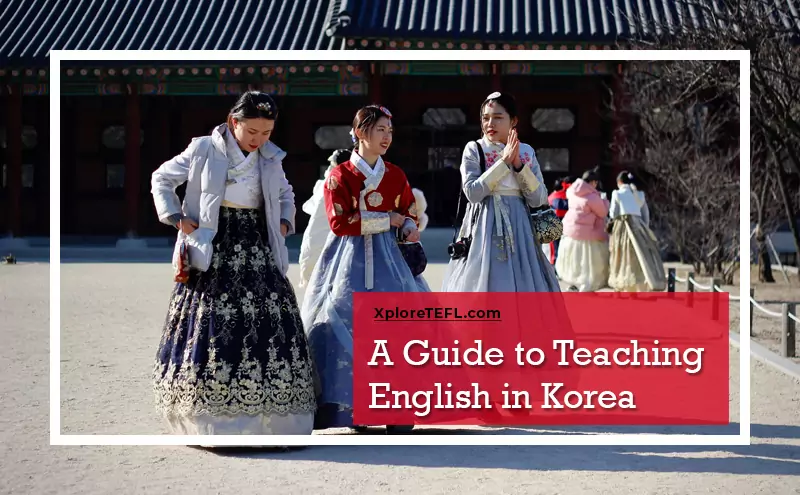The competitive salary and numerous job benefits offered to teachers in the nature-filled cities of South Korea cannot be compared to any other country in the Middle East.
To become an English teacher in Korea, you must meet the minimum requirements, including a degree and a TEFL certification. Being a native speaker is also very important. You can earn between US$1,300 and US$3,000 per month teaching English in Korea.
Korea provides you with a variety of natural and architectural wonders to enjoy while you build your career. Seoul, the country capital, is a vast, vibrant metropolis with a unique blend of ancient Buddhist temples, modern skyscrapers, street markets, and high-tech subways.
From the Seoul tower, where you get amazing panoramic views of the city, to the grand palaces highlighting its history, Seoul remains one of its top tourist destinations. There is the stunning Jeju Islands, Busa, the Andong Folk Village, and the Dadohaehaes and National Park.
With your TEFL qualification, a teaching career, and the numerous tourist spots, you can cook up exotic vacations in Korea every holiday.
Get a TEFL certificate and teach English in Korea to earn an attractive salary while traveling and exploring the world.
A Guide to Teaching English in South Korea

Are English teachers in demand in South Korea?
There is a high demand for English teachers in South Korea. Korea has one of the most diverse markets for ESL teachers globally, with different work environments for teachers employed in government-run programs, private institutions, and universities.
Meanwhile, the most diverse options for ESL teachers in Korea can be found in Seoul's capital city. Although Seoul is quite vibrant and has a very active nightlife, teachers who would instead work in a quieter environment can also find opportunities in Busan.
With an advanced economy and high demand for English teachers across the country, ESL teachers in Korea can easily find work online through recruitment companies on the internet. Besides sending you the latest job openings based on your preferred location, they are also always available to answer any questions on getting a job and settling in the country.
For extra income, many ESL teachers in Korea take private tutoring classes. However, this is non-permissible under the provisions of the E-2 work visa. You must be very careful as private tutoring in Korea may be very unstable and a little risky if you ever disagree with your student.
What qualifications do you need to teach English in South Korea?
A bachelor's degree is the least qualification required for an ESL job in South Korea, with a preference for native speakers. However, for better teaching opportunities in terms of higher salaries or a position in a public school, you must have an internationally recognized TEFL or TESOL certificate in addition to your degree.
The diverse nature of ESL jobs and the different types of institutions in Korea also affect the requirements. Government-sponsored programs such as the SMOE, GEPIK, TaLK, and EPIK require a TEFL certificate. Therefore, it is recommended that you visit the website for these programs for their specific requirements.
Also very important is the background check conducted before teachers can be able to work in Korea. For English teachers to teach legally in Korea, a background check is carried out to ensure that potentials teachers have a clean national criminal record and a perfect health condition by passing a health and drug test.
What type of jobs are available for English teachers in South Korea?
There are different types of teaching jobs available for ESL teachers in Korea. The most popular job types are found in the private schools, popularly referred to as 'hagwons' and public schools or government-sponsored programs.
Government-Sponsored Programs (Public Schools)
The government of South Korea supports government-sponsored programs to enhance public school education. These are usually the best options for ESL teachers without any teaching experience since they offer training on arrival.
ESL teachers working in public schools teach alongside a Korean co-teacher, enjoy much flexibility (you are allowed to design your lesson plans), fewer work hours, and paid holidays. Although pay is usually lower than other types of jobs in South Korea, government-sponsored programs offer secured contracts and are more organized.
Some of these programs include the Seoul Metropolitan Office of Education (SMOE), Gyeonggi English Program in Korea (GEPIK), Teach and Learn in Korea (TaLK), and the English Program in Korea (EPIK).
In programs like the EPIK, only one native ESL teacher is taken per school, and teachers do not choose the desired location. This means you may be the only foreigner in your school teaching alongside a Korean teacher. Work in public schools is between 8.30 am and 4.30 pm.
Private Schools
The major perk of teaching in a private school in South Korea is the slightly higher salary (than public schools) offered to ESL teachers and the chance to meet more foreign teachers. Each private school may have up to five native ESL teachers. The bigger the school, the higher the chances of having more foreign teachers. While morning classes are run between 10 am to 6 pm, private schools also have options for evening classes between 1 pm and 9 pm.
However, teaching in Korean private schools involves more teaching hours than public schools. ESL teachers may have to teach for up to 35 hours per week and even on some weekends. The schools offer about 10 days of paid holidays per year, and teachers with experience are usually paid higher salaries.
University Teaching Jobs
Universities have some of the highest-paying teaching jobs in South Korea. However, they also have higher requirements like a master's degree. You can consider teaching in a university after gaining valuable experience in other job types in South Korea because this gives you better chances of being hired. Although university teaching jobs pay higher than most other job types, they come with fewer benefits.
Private Teaching Opportunities
It is illegal to take private lessons under an E-2 visa (work visa) in South Korea. ESL teachers who offer private tutoring services are usually discreet and only do so with trusted clients. Being caught offering private lessons may make you lose your visa.
How to find English teaching jobs in South Korea?
Finding an English teaching job in South Korea is easy considering the availability of options and high demand for ESL teachers. Several ESL teachers in Korea apply through recruiters who send job openings notifications once you register on their websites.
Apply through Recruitment Agencies
Examples of recruitment agencies where you can apply to get ESL jobs in South Korea are Footprints Recruiting and Reach to teach. These programs are beneficial if you are starting and have no knowledge of the Korean language to help you communicate with potential employers. They can also help you negotiate better terms and ensure you have a smooth start. Another popular recruiting agency is Korean Horizons.
Apply directly to Schools
To get English teaching jobs in South Korea, you can apply directly to schools. You must read your contract correctly before accepting a job, because some private schools may offer lower salaries for longer work hours. Applying directly to a school is advisable if you already have experience teaching abroad and understand teaching conditions in Korea. Otherwise, it may be a lot easier to apply through recruiters.
Apply to Public Schools through Government-Sponsored Programs
Suppose you are applying through government-sponsored programs like EPIK, GEPIK, and TaLK. In that case, it is advised that you apply as early as possible as most positions are on a first-come, first-served basis. Also, the recruitment process takes very long, so you must send in your application early. For programs like EPIK, it is okay to apply at least six months earlier.
What is the salary for English teachers in South Korea?
The salary for English teachers in South Korea ranges between US$1,300 and US$3,000. The salary rate is higher in private schools and universities than in public schools and government-sponsored programs.
ESL teachers with TEFL qualifications can earn between US$1,300 and US$2,000 teaching English in public schools and government-sponsored programs in Korea with an average of 22 hours of work per week.
For teachers in private schools, the starting salary is about US$2,000, and teachers may earn as much as US$2,200 per month working between 30 - 35 hours a week. Teachers in universities earn higher between US$2,000 and US$3,000 monthly.
Benefits for ESL teachers in Korea are widespread with public schools and include return airfare, furnished accommodation, contract completion allowance, paid holidays, and settlement allowance, among others. Due to the high competition, not all private schools offer these benefits.
What type of visa do you need to teach English in South Korea?
You are required to obtain a work visa to teach English in Korea. This is usually referred to as the E-2 visa and can be gotten through the Korean Embassy or Consulate in your home country. The Korean immigration office sets specific requirements for ESL teachers to obtain an E-2 visa.
E-2 Work Visa
The E-2 visa is required to teach English legally in South Korea. There are specific requirements for an ESL teacher to obtain the Korean E-2 visa to teach. These include a bachelor's degree from a well-recognized institution, a clean background check on national-level criminal record, and a health and drug test pass.
In addition to these, you must be a citizen of the US, UK, Ireland, Canada, Australia, New Zealand, or South Africa. Nationals of Quebec may also apply if they can provide evidence of fluency in English and a degree from an English-taught university.
Citizens of India can apply as long as they can present a teaching license from their country.
Residence permit
It is crucial to begin applying for a residence permit in South Korea after getting your work visa. Once you have received your visa and arrived in South Korea, you will undergo a series of medical tests, after which your employer will help you apply for a residence permit. This must be done within 90 days of your arrival in the country.
Can you save money while teaching English in South Korea?
It is also possible to save money while teaching English in South Korea. Although Seoul, the capital city, is regarded as one of the most expensive cities in the world to live in, ESL teachers can still live comfortably on their salaries in Seoul and any other part of Korea.
Cost of living in South Korea
The cost of living for English teachers in Korea is significantly lower than the general cost since accommodation costs are already removed through free housing provided by schools.
You can expect to spend between US$500 to US$1,000 per month depending on your location and personal spending behavior.
Accommodation Options in South Korea
Accommodation cost is mostly out of the budget for ESL teachers in Korea. Schools will offer free accommodation to teachers usually well-furnished and with adequate utilities.
However, teachers who feel the need to get their apartments will find that cost of accommodation ranges from US$400 to US$1,000 depending on closeness to central districts.
When can you apply for teaching jobs in South Korea?
A typical school semester in Korea begins in March and another in September. The hiring season varies depending on the type of school.
For the public schools in Korea, applications may be accepted up to six months before the school year begin. In contrast, private schools can hire teachers at any time of the year.
Most schools in Korea will interview ESL teachers before considering them for a job. This could be over the phone or via email. However, many ESL teachers travel to Chile to look for jobs in person and attend interviews in person too, as the Korean language schools much prefer this.
Frequently Asked Questions
Can I teach English in South Korea without a degree?
No, except you are going to teach through a program like TaLk. You need a degree to obtain a working visa that will allow you to teach English legally in South Korea. Some programs like Teach and Learn in Korea (TaLk) take English teachers who are still enrolled in a Bachelor's degree.
Where can I teach in South Korea?
Important cities and the best environment for ESL teachers in South Korea to teach English include Busan, Seoul, Jeju, and Daegu. Seoul, which is the capital city, offers the most diverse opportunities both for teaching and for adventures during the holidays. However, you can consider Busan if you are more into the quieter lifestyle.
Do I need to know Korean to teach in South Korea?
No, you do not need to speak Korean to teach English in South Korea. However, a little Korean knowledge can help you maintain a more organized classroom, especially in the lower classes where students may not understand simple English commands. However, it is advised that you use more English words in the classroom so students can grasp the language faster.
How easy is it to get a teaching job in South Korea?
It is easy to get a teaching job in South Korea, considering the multitude of options available for English teachers. However, the preference for native teachers means finding a job in South Korea may be difficult for non-native ESL teachers.
Can a non-native get a teaching job in South Korea?
Yes. A non-native can get an English teaching job in South Korea, provided they have citizenship of a native English speaking country, have had at least ten years of their education in a native country since age 12, and have a bachelor's degree from a university in a native English speaking country.
Fun and travel activities while teaching in South Korea
South Korea is mostly referred to as the Land of the Morning Calm as a result of its immense beauty and the unique blend of old culture and modern lifestyles. The top favorite destination for tourists is Seoul, Korea's capital city. Seoul offers a fantastic mix of ancient temples, skyscrapers, historical sites, and the latest technology.
There is the War memorial to take you through the country's history and the Gangnam shopping district to feel the city's urban lifestyle. A visit to the Seoul Tower is also recommended for a panoramic view of the entire city.
Next is the coastal city of Gyeongju, the capital of the ancient Silla kingdom, where the Gyeongju's National Museum is located. At Gyeongju, you will find the Anapji Pond, the Bulguska Temple, a UNESCO World Heritage site, and the Tumuli Parks.
One of the most exciting cities to visit in Korea is Busan. Busan is the second-largest city in the country. It is famous for hosting the most extensive International Film Festival in Asia. Top attractions in Busan include Gwangali Beach, The Beomeosa Temple, and the Sealife Aquarium.
For lovers of nature and natural scenic beauty, Jeju Island is a place to visit. Located off the coast and adorned with a perfect natural landscape, including white sand beaches, waterfalls, lava lakes, and volcanic craters, Jeju Island is set to give a breath-taking experience. For sports lovers, you could try surfing at the Yangyang Surfyy beach. Although it is just recently becoming popular, many surfers are getting attracted to this lovely spot. The surfing culture is getting more interesting.
Other places to visit and things to do include the Gwangjang market for the best street food, the Jeonju Hanok village with the ancient traditional buildings known as Hanoks and Donaeko Jeju, a mystic waterfall valley on Jeju Island.







